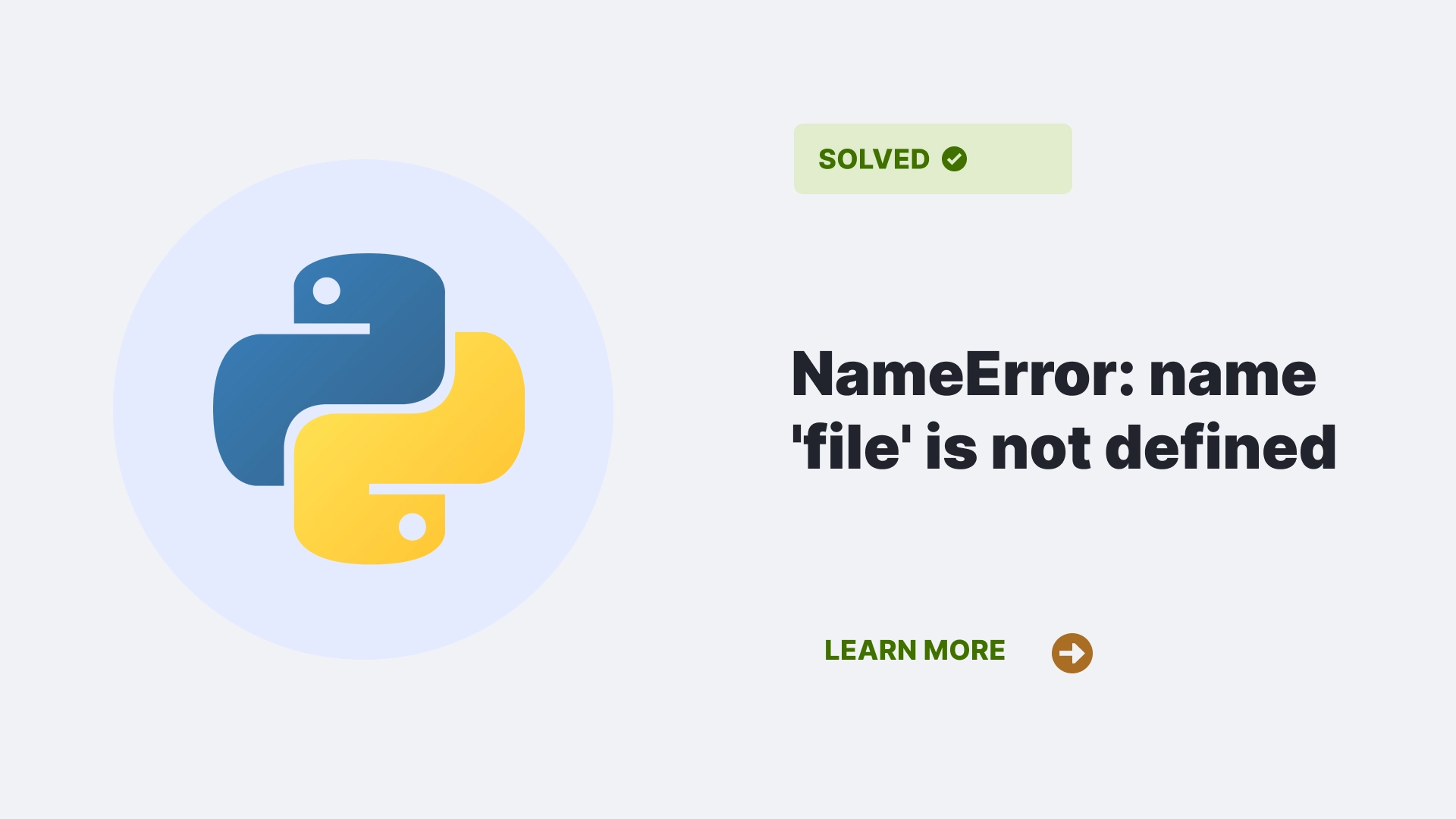Facing the “NameError: name ‘file’ is not defined” error while working with Python is a common phenomenon. Here is the complete guide for you to overcome this error. This error typically arises when executing code involving the now-obsolete file() function, which was removed in Python 3. This article will identify the potential causes and the step-by-step solutions for this error.
Contents
What is the “NameError: name ‘file’ is not defined”?
The “NameError: name ‘file’ is not defined” is a Python runtime error that occurs when attempting to use the ‘file()’ function in a Python 3 environment. This function was previously available in Python 2.
Then, it was used to open files for reading or writing. With the shift to Python 3, the ‘file()’ function was deprecated and eventually removed. This leads to this particular error when working with modern Python codes.
What Causes the “NameError: name ‘file’ is not defined”?
Outdated Code Compatibility
One of the main causes for the “NameError: name ‘file’ is not defined” is when you attempt to run the Python 2 code in a Python 3 environment. The ‘file()’ function was a standard method for file operations in Python 2, but it no longer exists in Python 3.
# Python 2 code
file_path = 'example.txt'
content = file(file_path).read()
print(content)Output:
NameError: name 'file' is not defined
In Python 3, attempting to run the above code would result in a “NameError: name ‘file’ is not defined”, as the ‘file()’ function is no longer available.
Failure to Import Required Modules
Sometimes, the error may be triggered by a failure to import the necessary modules for file handling. The corresponding module must be imported if the code relies on the ‘file()’ function. You must do so to avoid a NameError.
How do you resolve the “NameError: name ‘file’ is not defined”?
Now that we know the potential causes for the “NameError: name ‘file’ is not defined,” let’s explore effective solutions and proper Python codes. To resolve the “NameError: name ‘file’ is not defined,” you need to update your code. Doing so lets you use the correct file-handling mechanisms available in Python 3. Below are some solutions:
Use open() Instead
A common solution is to update the file operations using the ‘open()’ function. The open() function is the standard method for file handling in Python 3.
file_path = 'example.txt'
with open(file_path, 'r') as file:
content = file.read()
print(content)Make sure to replace ‘example.txt’ with the actual name and extension of the file you are working with.
Use the Proper Way to Access the Path
Ensure that you are accessing the file path correctly. This involves using the appropriate method to construct or retrieve the path.
import os
file_path = os.path.join(os.getcwd(), 'example.txt')
with open(file_path, 'r') as file:
content = file.read()
print(content)Use the inspect module
The inspect module can be employed to dynamically get the source code of a function or method.
import inspect
file_path = inspect.getfile(lambda: None)
print(file_path)Get the Current Working Directory with ‘os.getcwd()’
Ensure that you are working in the correct directory by obtaining the current working directory.
import os
# '/home/user/current_working_directory'
print(os.getcwd())Get the name of the module with ‘sys.argv’
You need to use the ‘sys.argv’ list if you want just the current module’s name.
import sys
print(sys.argv[0]) # 👉️ main.pyAccessing the Attribute on Imported Modules
If the ‘file’ reference is supposed to be an attribute of an imported module, ensure that the module is imported correctly.
# Python script (main.py)
import main
# '/home/user/example_directory/main.py'
print(main.__file__)Accessing the Attribute on Third-party Modules:
Also, you can access the attribute on third-party modules. To do this, you have to install the third-party modules
pip install transformers
pip3 install transformersNow, I can import the ‘transformer’ module and access its ‘__file__’ attribute to get the path to the file where the module is stored.
# Python script (main.py)
import transformers
# '/path/to/transformers/__init__.py'
print(transformers.__file__)FAQs
What is Python’s “NameError: name ‘file’ is not defined” error?
The “NameError: name ‘file’ is not defined” is a Python runtime error that occurs when attempting to use the ‘file()’ function in a Python 3 environment. Previously available in Python 2 for file operations, this function was deprecated and removed in Python 3.
How can I resolve the “NameError: name ‘file’ is not defined” error?
To resolve the error, update your code to use the correct file-handling mechanisms available in Python 3. Some solutions include using the ‘open()’ function instead of ‘file()’, ensuring proper file path access, and checking module attributes. Refer to the provided step-by-step solutions for detailed guidance.
Conclusion
Facing the “NameError: name ‘file’ is not defined” error can be challenging, but understanding its potential causes and the appropriate solutions can lead to a successful resolution. As the Python language develops daily, it’s important to stay updated with the latest Python trends. If you incorporate the correct file-handling processes for Python 3, it will be easy for you to work with Python 3. Thus, you can ensure a smooth execution of your codes without facing such errors.
Reference
Follow Python Clear for more updates regarding Python.

